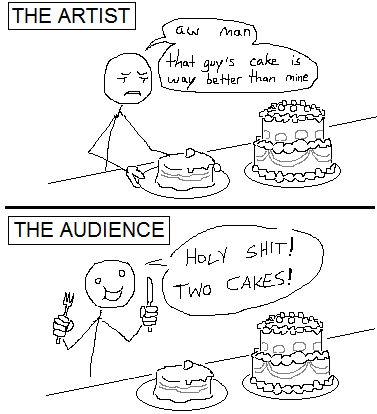Just a little context, I’ve had an on and off interest in text games for about 20 years now–which I’m aware practically makes me new blood to some of you–and essentially zero awareness of the community itself until after covid happened.
So it’s possible I’m talking out my ass here, but I’ve definitely noticed in recent years there are more and more “professional” looking games showing up, with art and music and so on and more polish all around. And of course, commercial games.
For many players I’m sure this is great, and I’m not knocking the talented people who showcase their work this way at all. But I have to say that part of what originally drew me to this medium was the rough edges and the pure nature of all these hobbyists laboring on in obscurity, making and playing the clunky text based games the world had passed by for no other reason than they enjoyed it.
The IFComp with its cash prizes and high profile nature is obviously an encouragement to put the best foot forward. So just based on a few factors:
1.) It’s VERY difficult to say that any modern game with a plot isn’t “interactive” “fiction”. Moreso now that the insertion of CYOA style choices has become the norm in some very high profile titles.
2.) The communities official stance is that if the author says something is IF, then it’s IF, no questions.
3.) Completely linear works are also IF.
(I’ve seen many of these on the IFDB.)
I’m beginning to wonder what this whole scene will look like in another five or ten years. Experienced game devs have good reason to launch titles though the IFComp, and when you’re already getting 100+ entries, I can completely understand resentment from voters when, say a passionately written but obviously amateur game that has no hope of winning shows up to waste their time.
As someone who struggles with anxiety and doubt over my own writing, even with the state of things now I couldn’t see myself ever bringing myself to enter the IF Comp. But is that going to become the case for more and more people just starting out and wanting to get a little feedback and their foot in the door?
Many IF games now are far more slick and professional, attractive and easy to play than the original commercial games were. It was daunting for hobbyist authors to even have to compare themselves to them, and yet where are we now?
Unfortunately I’m not sure of a solution short of a separate contest for amateurs, which would be too vaguely defined to serve any purpose. Just musing on the subject here.

 So you can prepare to enter in a very low stress low key way. Lots of pacing. Potentially lots and lots of time for playtesting. Or just start working on a game for fun, with no fixed goals, and see where you end up.
So you can prepare to enter in a very low stress low key way. Lots of pacing. Potentially lots and lots of time for playtesting. Or just start working on a game for fun, with no fixed goals, and see where you end up.